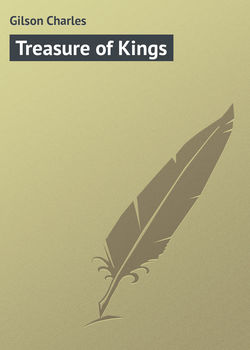Читать книгу Treasure of Kings - Gilson Charles - Страница 7
CHAPTER VII-AND AM MADE TO PAY FOR IT
ОглавлениеAnd that was the end of the mutiny on board the Mary Greenfield. The match was struck by a negro; the flames were fed with rum; and the fire flared up, just to be stamped out by the one strong man on board.
Amos at once released both the captain and his mate; whereupon Dagg treated the crew to a long-winded, high speech upon the subject of what he would do, if such insubordination occurred again; but as he had done naught during the crisis, but to get knocked down the moment he opened his mouth, there were few of his audience who were not laughing up their sleeves.
I have told the full story of the disturbance, to illustrate the character of Amos Baverstock. I have yet to write of the sequel to the trouble, which more nearly concerned myself.
For Amos was as good as his word, and made short work of William Rushby and of me. Though the crew had been bound over to keep the peace, as you might call it, admonished to behave themselves in future, the boatswain was not only degraded of his rank, but forthwith cast into irons.
As for myself, I was led before a kind of tribunal, assembled in the saloon. Captain Dagg, Amos Baverstock, and Joshua Trust were my judges; and a strange triumvirate they made, Amos chewing his black cigar, and all three seated before their glasses of grog, with their greasy playing-cards scattered before them on the table.
"Boy," said Dagg, "you joined in a mutiny. Do you know that, you whelp? Do you know what it means?"
"No, sir," said I.
"It means death," said Dagg. "The yard-arm-that's what it means."
I believed, for the moment, that they were really going to kill me; and so seriously had the great heat and the excitement affected me that I don't think I cared very much whether they did so or not. Anyway, I know I answered boldly, though I had never the courage to look straight at Amos, whose eyes I felt were upon me.
"Captain Dagg," said I, "if you want to murder me, get on with the matter. I ask you to do no more than to remember this: I did not come on board your ship of my own free will. I was kidnapped, and carried here by force, and I have no means of escape."
At that, Amos struck the table with his fist; and, bold though my words had been, I jumped as if a cannon had been fired.
"Silence!" he roared. "We are not here to argue with you. You were given your orders. You were told that on no account were you to communicate with anyone on board this ship, and you defied us. We have reason to suspect that you have taken into your confidence William Rushby, formerly boatswain. Do you deny it?"
He banged the table again. I looked right into his face, and it was just as if I was under fire. But I could never answer him. I had the pluck neither to lie nor to tell the truth.
"Good!" said he. "You admit as much. Well, then, we shall see that no such tricks are played us in the future. Rushby is in irons. As for you, for the rest of this voyage you remain a prisoner in your cabin; and if we have any more trouble with you-I warn you fairly-you meet the same fate as that hide-bound, cursed nigger."
And that was the lame and impotent conclusion of the mutiny on board the Mary Greenfield.
My lot was now even worse than before. For week after week I was locked in a stuffy cabin, and got neither fresh air, good food, nor exercise. The calm broke up quite suddenly with a squall, followed by a shower of rain. For about an hour the water came down like a cascade upon the sea, washing the ship from stem to stern, giving-as it appeared to me, looking out from my narrow port-hole-new life to the floating seaweed and the myriads of living things that were swarming in the midst of it.
The ship rocked, turning lazily from side to side, like a sleeper awakening, and then, lurching, took on a list to starboard, as the wind gripped her hoisted sails. And then, once again, we were under canvas, ploughing westward across that great, lonely ocean.
A few days later, we struck a trade wind, and made even better progress. Though I myself was never more miserable in all my life, I had reason to think that there was less discontent on board. I could hear the patter of the bare feet of the men on the deck above me, as they hastened about their work, as sailors should, and the shrill note of the boatswain's whistle-which caused me to wonder who the new boatswain was. It must be understood that during these days of my imprisonment I had nothing to read and nothing to do, but to meditate upon my own misfortunes.
